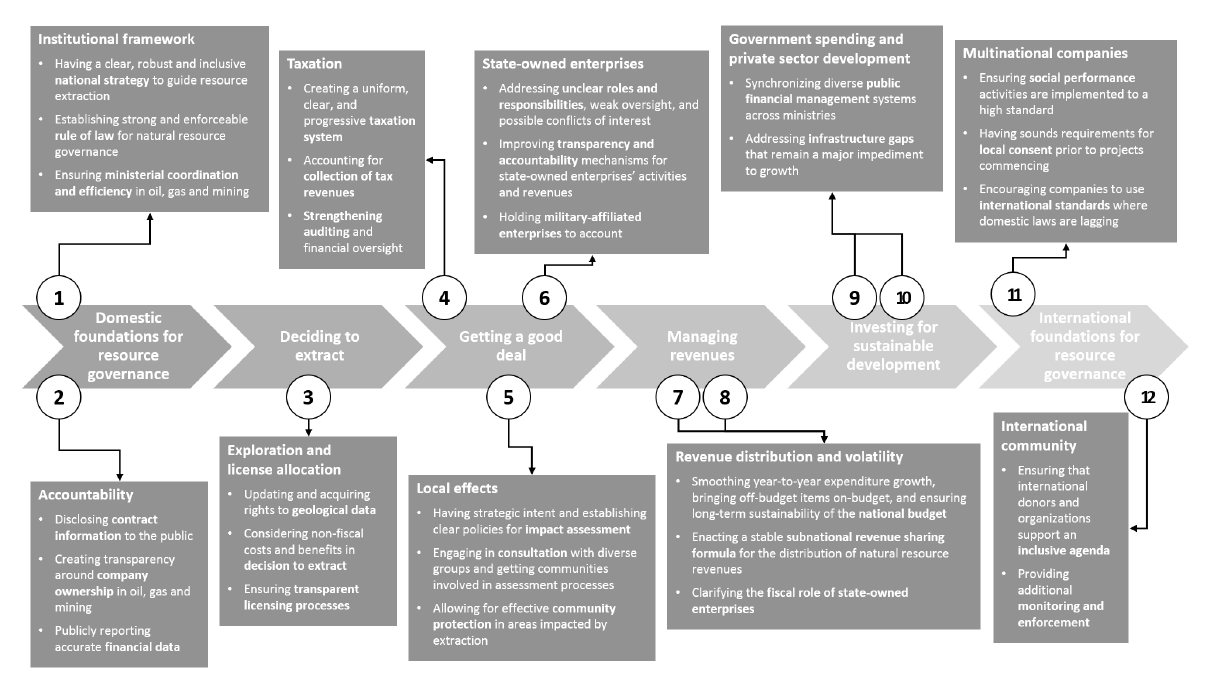
Outlining a Unified Agenda for Resource Governance in Myanmar
Myanmar’s natural resources, including deposits of oil, natural gas, gemstones and other minerals, have attracted growing interest from foreign and domestic investors at a time of regulatory and institutional change. A newly-elected government led by the National League for Democracy (NLD) appears poised to expand on major political and economic reforms that began in 2010. Incoming leaders must carefully consider policy options for supporting economic growth, ensuring environmental and social protection, and establishing transparent and accountable processes in the extractive industries.
In Myanmar, the Natural Resource Charter has helped facilitate discussion on leading issues and challenges in the oil, gas and mining sector within the context of the Extractive Industries Transparency Initiative (EITI). EITI is a global initiative that encourages countries to disclose natural resource revenues and contracts. The EITI process, directed by a multi-stakeholder group (MSG) composed of government, private sector, and civil society representatives, is the first fully inclusive forum for discussion of the extractives industries and their impacts in Myanmar. A key milestone in this effort has been the recent publication of the first Myanmar EITI report in January 2016.
Although effective governance of natural resources can provide a strong foundation for growth and development in resource-rich countries, reaching consensus over how to manage the extractive industries is often a sensitive and challenging process. In Myanmar, this dialogue has been challenging due to the technical complexity of the issues at hand, and deep-seated distrust between stakeholders.
With such needs in mind, the Natural Resource Charter was established in 2010 as a tool for guiding complex policy decisions. The charter is an organizing framework composed of 12 principles ("precepts") that helps governments and other parties thinking through the challenges of using resource wealth. Building on the multi-stakeholder approach established by EITI, it contains considerations for governments, companies, civil society and the international community. Since its inception, the charter has supported efforts to improve resource governance in countries including Nigeria, Sierra Leone and Tanzania.
Over the course of 2015, NRGI facilitated consultations in Myanmar focused on the core principles of the charter. NRGI’s work built on literature review and bilateral interviews led by the University of Queensland’s Centre for Social Responsibility in Mining, with in-country support provided by Yangon-based NGO Spectrum. All told, more than 30 organizations and numerous individuals – key actors involved in EITI and beyond – contributed to the research and consultation process.
The product of this initiative is Myanmar and the Natural Resource Charter , a report that outlines a framework for future debate and reform. The document identifies 28 key issues based on the 12 principles of the charter (summarized in the figure below). Reflecting the views shared by local stakeholders with NRGI, it aims to build common understanding about the challenges Myanmar faces in transforming extractive wealth into tangible benefits. It also highlights key areas where concrete reforms should be prioritized.
Priority issues for Myanmar, based on the Natural Resource Charter
[click here to enlarge]
This experience with the Natural Resource Charter represents a step toward more comprehensive, inclusive and grounded discussions on oil, gas and mining policies. In Myanmar, where consultative processes remain crucial to integrating local knowledge and experience with international expertise and best practices, this report will hopefully serve as a starting point for further policy discussions among in-country stakeholders. Ideally, it will also contribute to informing and outlining a comprehensive reform agenda for the government’s actions from this year forward.
In other countries, the Natural Resource Charter is being used in support of efforts to improve governance of the extractive industries. In Sierra Leone and Tanzania, for example, governments have utilized the framework to carry out national self-assessments for planning and policy development. A group of independent experts in Nigeria has also used the charter to review progress on oil sector reform. More about the framework and its applications around the world are available on NRGI’s website.
Paul Shortell is a Luce Scholar working with NRGI’s Asia-Pacific team.
